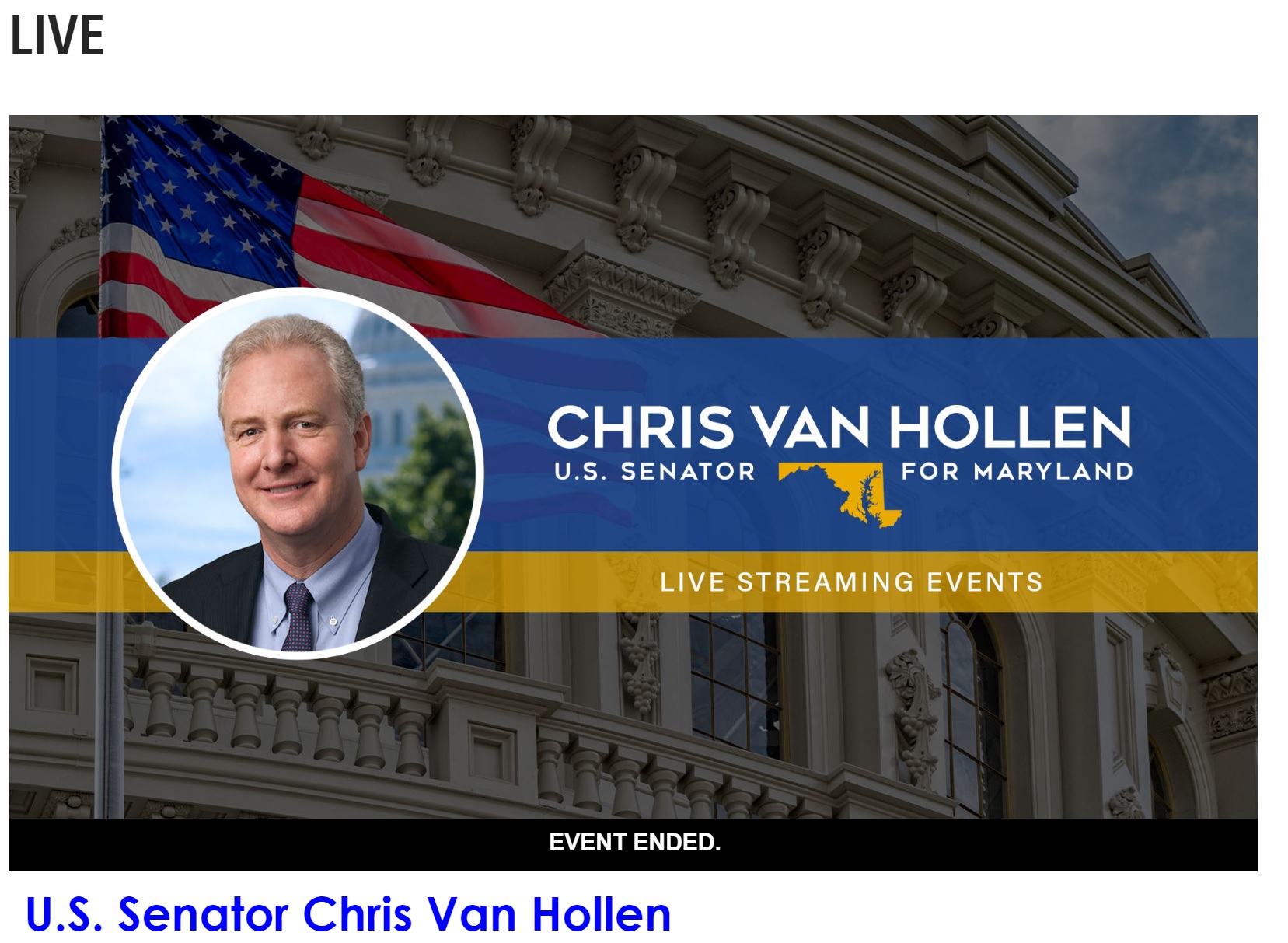
A screenshot of Sen. Chris Van Hollen's (D-Md.) website, from which he hosted a web stream of a telephone town hall Wednesday with constituents and Johns Hopkins University's Vice Dean for Public Health Practice, Joshua Sharfstein.

A screenshot of Sen. Chris Van Hollen's (D-Md.) website, from which he hosted a web stream of a telephone town hall Wednesday with constituents and Johns Hopkins University's Vice Dean for Public Health Practice, Joshua Sharfstein.
Van Hollen urges gradual normalization, further federal action in telephone town hall
SILVER SPRING, Maryland—Sen. Chris Van Hollen (D-Md.) cautioned Wednesday against a quick end to social distancing measures counteracting the COVID-19 pandemic’s spread in a telephone town hall featuring Joshua Sharfstein, vice dean for public health practice at Johns Hopkins University.
“We need to make sure that we defeat the virus before we go back to life as normal,” Van Hollen said. He warned that officials should not be “driven by some kind of political timetable” in their efforts to return to normalcy.
His remarks closely follow statements from President Donald Trump, who said on Tuesday that some states may be able to end social distancing measures and reopen their economies “maybe even before the date of May 1.”
But Van Hollen argued that “if people start going back to work or school too early, and that just reignites the spread of the virus, we will not have accomplished our goals.” He also said Maryland’s coronavirus cases were still on an upward incline and had not yet “plateaued.”
Three individuals first tested positive for the novel coronavirus March 5 in Montgomery County. Forty-one days later, the Maryland Department of Health has confirmed over 10,000 positive cases and attributed 349 deaths to COVID-19. On Wednesday, state officials also noted the deaths of 64 individuals who were not tested for the virus, but likely died from it.
Sharfstein echoed Van Hollen’s stance on the importance of social distancing in combating the spread of the coronavirus.
“You have to give the virus fewer chances to jump from person to person,” he said. “When people stay home, they’re not in contact with other people. The virus doesn’t have that chance.”
Maryland has enacted increasingly more aggressive contingency measures to slow the spread of the virus since it was first detected in the state.
On March 16, Gov. Larry Hogan enacted an executive order closing restaurants, bars, movie theaters, and gyms. All non-essential businesses were ordered to close March 23, and a stay-at-home order was put in place for residents March 30.
Hogan also announced Wednesday that the state was ready to begin planning for crisis recovery, during which it would expand testing availability, increase hospital capacity, boost production of personal protective equipment for medical professionals and establish a tracing and containment operation.
In the same announcement, Hogan said the use of masks or face coverings would be mandated in retail spaces and public transportation throughout Maryland, effective April 18 at 7 a.m.
The good news, according to Sharfstein, is that “[social distancing] appears to be working to prevent things getting overrun.” He added that easing the virus countermeasures would be, “like a dimmer switch—we’ll have to go slowly. Because otherwise, it could go from 2 [cases] to 4 to 16, and we’ll be right back where we were before.”
In the meantime, he suggested officials ramp up testing availability and allow the health care system to recover from stress. Sharfstein also noted the virus’ roughly two-week lifespan, and didn’t “believe that people will be walking around for weeks or months making others sick.”
Van Hollen recognized the economic pain social distancing had inflicted on Marylanders, and pointed to the Coronavirus Aid, Relief and Economic Security Act—a $2 trillion relief package for individuals and businesses adversely affected by the coronavirus pandemic—passed in Congress at the end of March as the federal government’s biggest legislative response to the crisis.
But he said there would be “additional need for Congressional action.”
According to Van Hollen, future federal disbursements should address the needs of assisted living centers and nursing homes, the United States Postal Service, restaurants, small businesses and students with internet accessibility problems who are being forced to learn remotely.
He also said that “in next bill, we hope to increase funding to boost participation and allow for safe voting.” Van Hollen anticipated Maryland’s June 2 primary elections would take place mostly by mail, with special accommodations for walk-in voters to participate in social distancing when necessary.
Van Hollen closed out the town hall by reminding constituents to complete the census online or by phone. “For every Marylander that does not answer the census, it will cost our state $18,000 in lost federal funds for 10 years,” he said.
If you are a Maryland resident whose life and livelihood have been substantially impacted by the coronavirus pandemic and would like to share your story, email the author at heliocentricnonchalance@gmail.com.